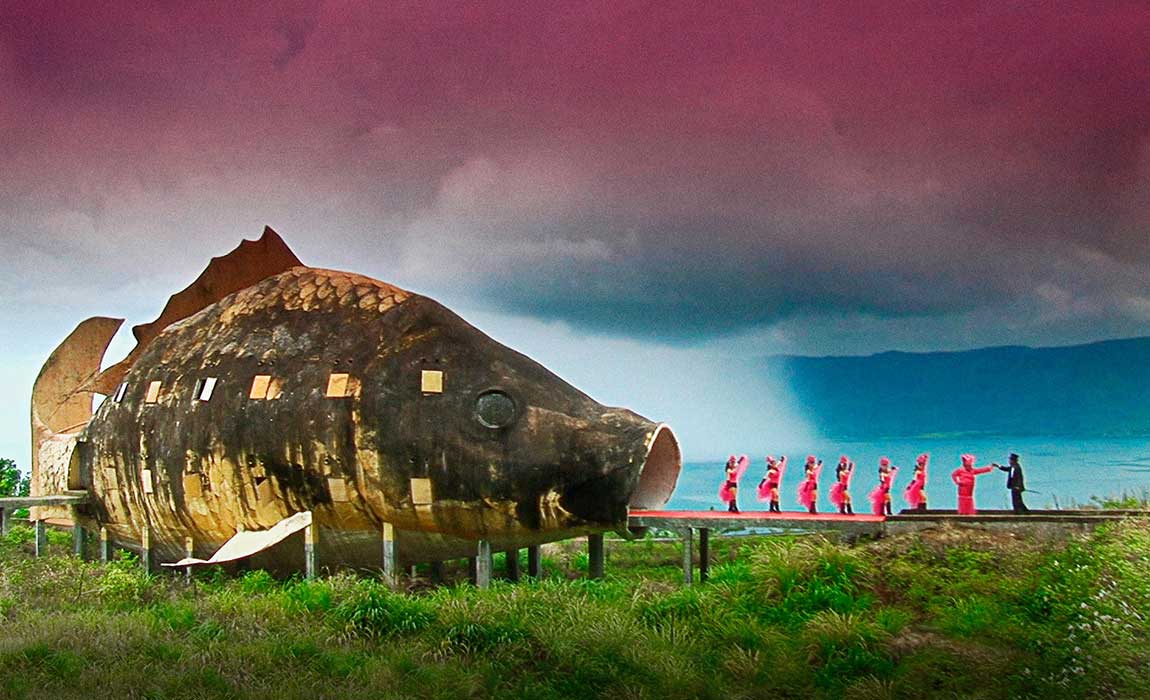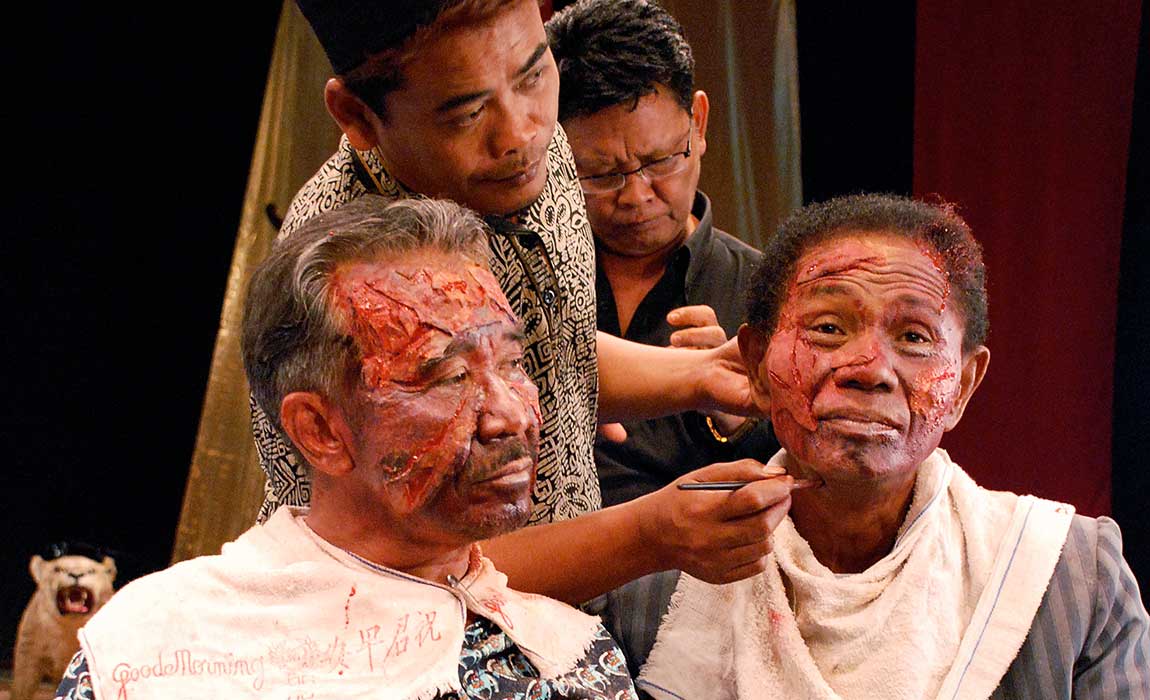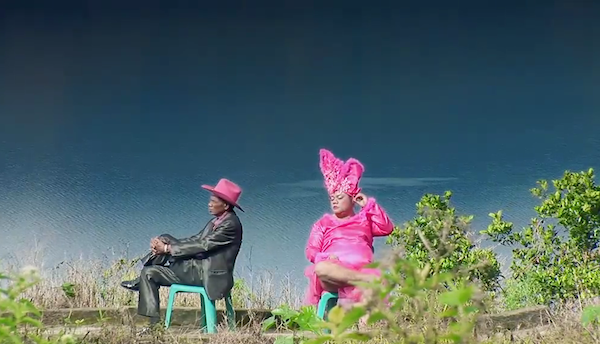‘A Bricolage of Shit': The Act of Killing’s New Take on Documentary and Genocide
The Act of Killing has been the talk of Sydney Film Festival. Director Joshua Oppenheimer tells how his astonishing documentary came together.
The Act of Killing screened last week as part of the official competition at the Sydney Film Festival. And the consensus of nearly everybody who has seen it has been that it's one of the most compelling, original and affecting documentaries they have ever seen. More to the point, in the two and a half hours you sit in company with it in the dark of the cinema, The Act of Killing rips up your idea of what a documentary is supposed to be.
Principally, The Act of Killing, directed by American filmmaker Joshua Oppenheimer, traces the aftershocks of the coup that brought President Suharto to power in Indonesia. The government was overthrown by the military in 1965 and the Indonesian Communist Party (PKI) eradicated, alongside anybody accused of being a communist, including union members, 'leftists', intellectuals and the ethnic Chinese.
"I started this project working in a community of survivors," Oppenheimer explains when he sat down with us earlier this week. "Trying to make a film about the horrors that had happened but also about the regime of fear and impunity and corruption under which they're still living. And every time we'd film together we'd be stopped by the military. But living in the same village as the survivors were the perpetrators. And they were boasting to me. I would meet them in the street, they would invite me in for tea, and they would boast about what they had done. That was the crack in the facade of normalcy. And I came to understand very quickly that the big story here is not what happened in 1965. This is about what's happening now."

https://youtube.com/watch?v=zJ5_JAgoZ5Q
Your friend, the war criminal
The film's central focus is Anwar Congo, a self-styled gangster who made his money during the '60s as a ticket scalper at the local cinema in North Sumatra's capital city, Medan. When the coup began, the army used paramilitaries and gangsters like Anwar to carry out the massacre of what is estimated to be around 1 million people. With Anwar and his friends, Oppenheimer saw an "opportunity to document the nature of impunity honestly. It's a situation where the killers have won, they've been celebrated by the whole world, and therefore they're open about it. As opposed to what we normally see: killers either deny what they've done, or apologise for it."
To try to understand the function of the men's boasting, he asked them to re-create scenes about the killings in whatever way they wished, and the men — fans of American films and culture — took to screenwriting and acting. "The film is my way of understanding a whole regime of impunity, the imagination of the impunity, the way they, like all of us, use storytelling to create their reality," says Oppenheimer. "And as part of that they use storytelling to escape from their most bitter truths."

Turning Documentary On Its Head
Documentary has a unique kind of power, if not exactly to reveal the invisible than to speak of things we prefer to ignore. And as media proliferate, diverge and splinter, non-fiction films seem to be finding a fresh voice. It isn't that documentary has ever really inhabited a magical land of objectivity and absolute 'truth'. The difference is that fact and fiction are increasingly hazy in our minds, and just about everything we once thought of as 'non-fiction' — politics, sport, celebrity, advertising — involves a certain amount of wavering between the real and the unreal.
And waver between the real and unreal is precisely what The Act of Killing does, unfolding in a space that's both horrifyingly straightforward and technicolour phantasmagoria. The film flits between frank accounts of the men explaining and demonstrating how they killed their victims and surreal images from their re-creations — a line of women dancing in the mouth of a giant fish, Anwar's head decapitated but still speaking, a man in drag smoking a cigarette singing about taking his girlfriend to the movies.
Many of the most powerful scenes in the film fit somewhere in between reality and fiction. "There were these moments of pure poetry that weren't scenes," says Oppenheimer. "They're observational scenes in a way — about how we're lost in our fantasies. They're documentary scenes, in a surreal space. So the film obtains a density and a richness because we have a sense that there are all these stories that are untold. There's a plot behind these scenes, but we don't know what it is and it doesn't matter."

We Tell Ourselves Stories in Order to Live
Legendary filmmaker Werner Herzog, who happens to be executive producer of The Act of Killing alongside Errol Morris, declared in 1999 that simply holding up a camera and capturing what's around you isn't sufficient in documentary filmmaking. "There are deeper strata of truth in cinema," he said, "And there is such a thing as poetic, ecstatic truth. It is mysterious and elusive, and can be reached only through fabrication and imagination and stylisation." That is precisely what The Act of Killing does.
By asking Anwar and his friends to re-create scenes of the massacres, the filmmakers expose the unacknowledged complexity of the Indonesian genocide. "I think Anwar's trying to escape from his pain," says Oppenheimer, referring to many of the scenes where Anwar and his friends portray themselves as heroes for massacring thousands of people. "Every time he does it he re-avoids the moral meaning of the killing, and reifies his denial. It's a way of escaping the reality of what he's done, or so he thinks. But it also becomes the prism through which he recognises what he's done."
What the film uncovers is that the stories told by the perpetrators are a product of something far more profound than simple cruelty. "Yes, those stories are instruments of fear and they keep everybody else afraid, but paradoxically they're not symptoms of the remorselessness of the perpetrators. On the contrary, they're symptoms of their humanity. The celebration of genocide can simply be a symptom of a stridency you adopt because you don't believe your own justification. And if there's a thread defining the film's development, it's Anwar's subtext — it's the look on his face showing he never seems to believe the things he's saying."
What The Act of Killing does is take the storytelling process, and instead of using it as the Indonesian elite does — to keep people afraid — the film uses storytelling as an instrument of moral understanding. "Our entire world is made up of second-hand, third-rate stories. And I think we have no choice, since that's what our world is made of, but to recover these stupid stories for something humane. So the film is a kind of recycling, a kind of bricolage of shit, trying to make something beautiful out of the shit."

When Art Makes A Difference
The Act of Killing has received international acclaim since its premiere last September, but more importantly it has caused an upheaval in Indonesia. "It's screening every day," explains Oppenheimer. "As of March it had screened over 500 times. The Indonesian media is now publishing serious investigative reports about the genocide, whereas for forty-seven years they'd been silent about it. It's caused a sea change in how the country sees its past. It's come to the country like the child in The Emperor's New Clothes pointing to the king and saying "the king is naked". And everyone knew it. Maybe they didn't know the details. But now that it's been said so powerfully — and by the perpetrators themselves — there's no going back. The government has chosen to ignore it for the moment, although some army groups and some paramilitary generals have been threatening people screening the film, and threatening me. But it is making a real difference.
"Werner [Herzog] said to me when I was talking about this to him over dinner, 'Josh, art doesn't make a difference.' And he looked at me for a long time and I felt rather deflated. And he smiled and then he said 'until it does'."

The Act of Killing will get a limited Australian cinema release through Madman Entertainment on October 3, 2013.







